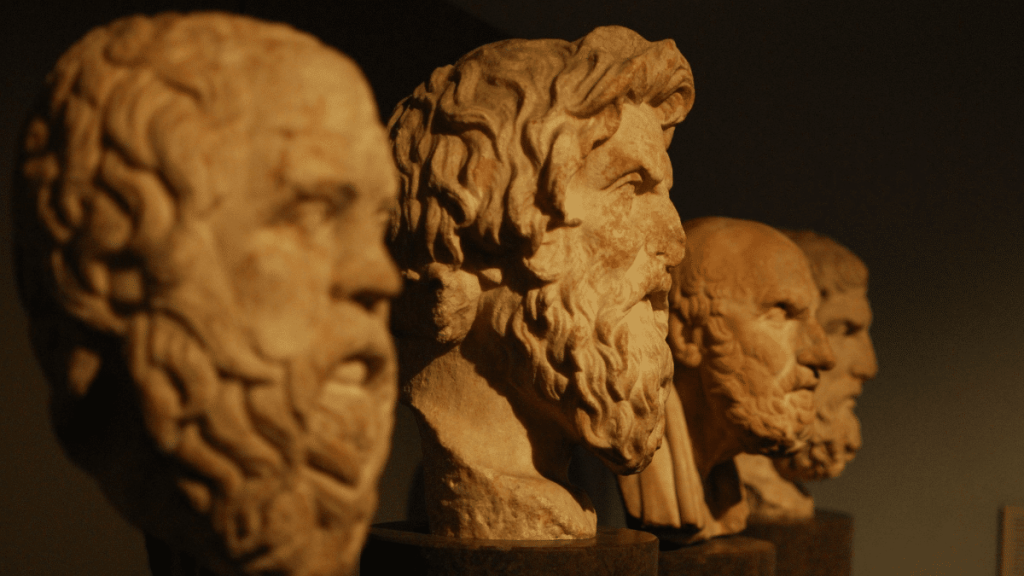Stoicism is a philosophy that has been around for over 2,000 years. Despite its age, its teachings are still applicable today. Stoicism is a practical philosophy that offers a roadmap to living a fulfilling life. By focusing on what is essential and letting go of what is not, the Stoics believe that we can achieve a sense of tranquillity and purpose. This philosophy has influenced many prominent figures throughout history, including Marcus Aurelius, Seneca, and Epictetus. In this article, we’ll explore some of the key Stoic principles and beliefs that can help us navigate the challenges of modern life.

The Stoic philosophy of ethics
The Stoic philosophy of ethics is based on the idea that we should strive to live a virtuous life. Virtue is the highest good, and it is achieved through the cultivation of wisdom, courage, justice, and self-discipline. The Stoics believed that we should always act by reason and the natural law and that we should avoid excess and extremes.
Marcus Aurelius, a prominent Stoic philosopher and Roman emperor, wrote in his Meditations: “Do not waste what remains of your life in speculating about your neighbours, unless with a view to some mutual benefit. To wonder what so-and-so is doing and why, or what he is saying, or thinking, or scheming – in a word, anything that distracts you from fidelity to the Ruler within you – means a loss of opportunity for some other task.”
This passage emphasizes the importance of focusing on our own actions rather than being distracted by the actions of others. By staying true to ourselves and our values, we can live a virtuous life.
The Importance of self-control in Stoicism
Self-control is a crucial aspect of Stoic philosophy. The Stoics believed that we should be in control of our emotions and desires, rather than allowing them to control us. To achieve this, we must practice self-discipline and restraint.
Epictetus, another well-known Stoic philosopher, said: “No man is free who is not master of himself.” This statement highlights the importance of self-mastery in Stoicism. We must be in control of our thoughts and emotions if we want to live a virtuous life.
Self-control is not just about suppressing our desires, but also about directing them towards what is good and virtuous. By practising self-control, we can avoid excess and live a balanced life.
The Stoic concept of virtue
Virtue is the cornerstone of Stoic philosophy. The Stoics believed that living a virtuous life is the key to achieving inner peace and happiness. Virtue is not just about doing what is right, but also about cultivating wisdom, courage, justice, and self-discipline.
The Stoics believed that there are four cardinal virtues: wisdom, courage, justice, and self-discipline. These virtues are interrelated, and they all contribute to living a virtuous life.
Seneca, a Roman Stoic philosopher, wrote: “Virtue is nothing else than right reason.” This statement emphasizes the importance of reason in achieving virtue. By using our reason to guide our actions, we can live a virtuous life.
The role of Reason in Stoicism
The reason is a crucial aspect of Stoic philosophy. The Stoics believed that we should use our reason to guide our actions and decisions. By doing so, we can live by nature and the natural law.
Marcus Aurelius wrote in his Meditations: “The universe changes; our life is what our thoughts make it.” This statement highlights the importance of our thoughts and how they shape our perception of the world.
In Stoicism, the reason is not just about intellectualism, but also about practical wisdom. We must use our reason to make good decisions and act by nature.
The Stoic approach to emotions
The Stoics believed that we should not be controlled by our emotions. Emotions are natural, but they can also be destructive if we allow them to control us. The Stoics believed that we should acknowledge our emotions, but not be ruled by them.

Epictetus wrote: “If you are ever tempted to look for outside approval, realize that you have compromised your integrity. If you need a witness, be your own.” This statement emphasizes the importance of being true to ourselves and not seeking validation from others.
The Stoics believed that we should cultivate a sense of detachment from our emotions. By doing so, we can avoid being consumed by them and make rational decisions.
The Stoic view on living by nature
Living by nature is a central tenet of Stoic philosophy. The Stoics believed that everything in the universe is interconnected and that we should live in harmony with the natural world.
Seneca wrote: “Nature does not demand that we be perfect. It requires only that we grow, that we strive for self-improvement.” This statement highlights the importance of continuous self-improvement and growth.
Living by nature is not just about respecting the environment, but also about living a simple and honest life. By living in harmony with the natural world, we can achieve a sense of inner peace and fulfilment.
The concept of fate and acceptance in Stoicism
The Stoics believed in the concept of fate or the idea that everything that happens is predetermined. However, they also believed in the importance of accepting our fate and living in the present moment.
Marcus Aurelius wrote: “Accept the things to which fate binds you, and love the people with whom fate brings you together, but do so with all your heart.” This statement emphasizes the importance of accepting our circumstances and finding joy in the present moment.
The Stoics believed that we should not waste time worrying about the future or regret the past. Instead, we should focus on the present moment and make the most of it.
The relevance of Stoicism in modern times
Despite being developed over 2,000 years ago, Stoic philosophy is still relevant today. Its teachings offer a practical and accessible way to navigate the challenges of modern life.
In a world that is often chaotic and unpredictable, Stoicism offers a way to find inner peace and purpose. By focusing on what is essential and letting go of what is not, we can achieve a sense of tranquillity and fulfilment.
Stoicism has influenced many modern thinkers and leaders, including Ryan Holiday, Tim Ferriss, and Naval Ravikant. Its teachings have also been incorporated into modern cognitive-behavioural therapy (CBT).
Conclusion
Stoicism is a philosophy that has stood the test of time. Its teachings offer a practical and accessible way to live a fulfilling life. By focusing on what is essential and letting go of what is not, we can achieve a sense of inner peace and purpose. The key principles of Stoicism revolve around the idea of living a virtuous life, accepting what is outside of our control, and cultivating inner peace through self-discipline. These principles are still relevant today and can help us navigate the challenges of modern life.

